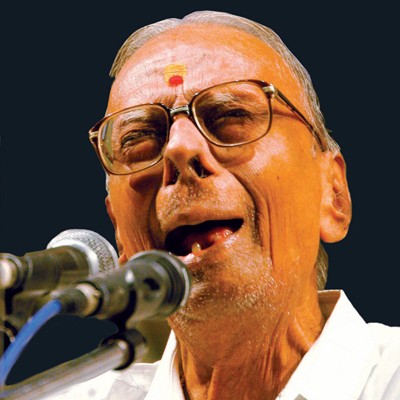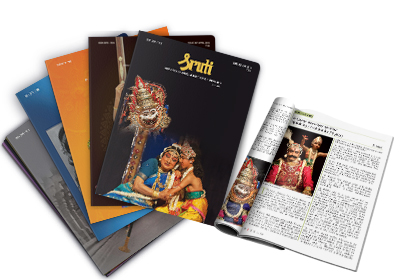
Vidwan R.K. Srikantan passed away in Bangalore on 17 February 2014. He was one of the oldest masters of classical music. He continued to perform like no other at a ripe age. He was a predominantly self-made artist in an art that requires training from a guru for a long period, and he has passed on the art to numerous disciples who have made a name for themselves. Just before his concert at the Music Academy, this nonagenarian was playing an imaginary tic-tac-toe on the ground with his walking stick, as he waited for his retinue to arrive. His biography titled Voice of a Generation, was released on his birthday on 14 January in Bangalore. It was indeed very inspiring for Aishwarya Srinivas to interview her guru Sangita Kalanidhi R.K. Srikantan, a Padma Bhushan awardee, and to learn about his long career as a musician, a few days before he turned 94.
Who inspired you when you were a young listener?
I attended the concerts of great masters like Ariyakudi Ramanuja Iyengar, Maharajapuram Viswanatha Iyer, Chembai Vaidyanatha Bhagavatar, Palghat Rama Bhagavatar, Veeruswami Pillai and tavil Meenakshisundaram Pillai at Bangalore and in Chennai where my brother lived. That gave me the inspiration to take up music as a career and earn the kind of vidwat and gauravam that these musicians made for themselves. I sat through these concerts with eyes closed and tried to reproduce all the nuances. I was eager to imbibe the good in all the styles and also weed out anything that was not required. I was also keen to take criticism in the right spirit.
You were well educated. Why did you choose to take up music as your career?
After my Bachelors, I enrolled for a Masters in history. But I could not continue as my musical leanings got stronger. My brother R.K. Venkatrama Sastry was very keen on making me a good vidwan. My father, a scholar and Harikatha exponent, was also adept in music. There was enough music around to ensure I was inspired and engaged by music all the time.
You must have had a rigorous sadhakam schedule?
Yes. It is only by hard work that you can achieve great heights. I did severe sadhakam those days, singing varnams in four kalams, and specific sadhakam for sustaining the sruti. I would take up one raga and improvise, work on my manodharma for one whole month and practise all the compositions in that raga. A good artist is made of 25% marga darsanam of the gurus and 75% sadhakam.
How do you maintain your voice? It is remarkable that even now it is steady and reverberating, with no trace of ageing.
Although a voice is God-given, you have to make special effort to maintain it. You must eat satvika food, say no to spicy food. Also it is important to talk less, specially when you have concerts. I have always ensured a gap of at least one week between two concerts. This is required to rest the voice and to avoid repetitions in kalpana sangeetam.
How important is bhakti to your music?
Without devotion the works of all our great composers become meaningless. Bhava is what gives music its form. Plain ragas are abstract. Only when sung with bhava does music acquire meaning. As Tyagaraja has said, “Sangeeta gnanamu, bhakti vina sanmargamu galade”, and “Sadbhakti sangeeta gnana viheenulaku mokshamu galada”. Our music is essentially bhakti music, and without devotion it is meaningless.
Do you think the current generation can relate to tradition and bhakti in music?
Yes of course. Teachers should inculcate these along with the music, just as parents teach devotion to their children. This is as important as providing them with food and other necessities.
You have also been a remarkable teacher and continue to inspire many students in the traditional approach to your music.
I started teaching students even as a 13-year old. I have evolved methods to teach all kinds of students according to their voice, intelligence and grasping abilities.
What do you feel about introducing complexities in concerts, like singing vivadi scales and complex laya exercises in pallavis?
I believe you should be aware of all the theoretical nuances and laya intricacies so that you can prove yourself if challenged. But otherwise, it is not necessary to indulge in these things, as too much of these complexities will rob the concert of its ranjakatvam, the rakti gunam will be gone. Even Venkatamakhi has acknowledged this. Bliss or ananda can never be achieved if we indulge in such practices. It is, however, good to be able to perform these for the sake of knowledge.
What is the purpose of music?
Music or any art for that matter is a matter of anubhavam. When atmanubhavam translates into a pleasing experience for the listeners, that is when there is bliss. Continued ability to provide such experiences leads to success.
Your tryst with Haridasa compositions...
My employment with AIR gave me the opportunity to come across a lot of these beautiful compositions. I was in service for 32 years. I was inspired to tune them and make them concert items and popularise them.. Their devotional and philosophical content is very deep.
You seldom sing Tamil compositions even during concerts in Chennai.
“Naanum Tamizh daan ma”. My ancestors were originally from Senkottai in Tanjavur, and they migrated to Karnataka about a thousand years ago. My bani is also predominantly based on the Tanjavur gamaka oriented style. I used to sing a lot of Tamil songs as main items and as tukkadas during my earlier days, but later, people requested for these songs after the main song. I sing a lot of these Devarnamas. I do like a lot of Tamil compositions. Eppo varuvaro is one of my favourites. I have even set a Devarnama to a similar tune in Jonpuri inspired by this song.
What is your advice to young musicians on planning concerts?
It is important to be disciplined. Freedom with restraint is what is required. The concert list has to be prepared at least one week in advance, with variety in composers, ragas, talas and tempo. Also, it is important to have a pleasant rapport with the accompanists and encourage them. Musicians must maintain a positive outlook even while dealing with some organisers who act petty or do not extend reasonable hospitality. I maintain a gauravam and, without one bit of ego, try to let them know. It is important to maintain a nice attitude. I believe the personality of a musician is reflected in his or her music.
What are your views on composing new kritis?
The compositions of our music trinity and other great composers are so valuable and vast that not just one janma or birth, but several janmas are not sufficient to learn them all. That being the case, how can I compose new kritis? I am not indispensable to music, but music is indispensable to me. I do not sing songs of any contemporary composers. However, I have set tunes to and orchestrated many compositions while in AIR.
You have won many prestigious awards and titles including the Padma Bhushan for your contribution to music. You are largely responsible for creating a special place for Karnataka in Carnatic music.
I consider the appreciation of vidwans to be the highest of all awards. Many great vidwans have appreciated my music; all senior violin and mridanga vidwans have accompanied me in concerts. Once at Bharat Kalachar, after my concert, Umayalpuram Sivaraman said it was his great fortune to have accompanied me in the concert. I consider it very special and will cherish it forever. I am very fortunate to have such a family. My wife and children have been very cooperative and extended full support to me. I only pray that I keep singing as long as I live.
(Aishwarya Srinivas is a Carnatic vocalist)


